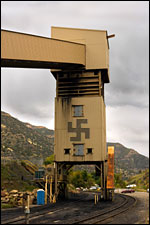
Andy Revkin has an interesting post on Dot Earth about global warming and Holocaust analogies. On Oct. 22, climate scientist James Hansen testified before the utilities board in his home state of Iowa. He said, among 59 pages of other stuff, this:
If we cannot stop the building of more coal-fired power plants, those coal trains will be death trains — no less gruesome than if they were boxcars headed to crematoria, loaded with uncountable irreplaceable species.
Hansen was subsequently scolded by Kraig Naasz, president of the National Mining Association, and Kenneth Jacobson, deputy national director of the Anti-Defamation League. Others, including Princeton bioethicist Peter Singer, back Hansen up.
Is the analogy "appropriate"? No doubt there will be a great deal more huffing and puffing on that question, which ultimately has no answer. To me it seems more fruitful to think carefully about what the analogy does and doesn’t mean, and what’s it’s trying to do.
Why do we judge the Holocaust unique in history? It’s not the sheer number of deaths — there are episodes of human history in which more people died in a shorter period of time. Stalin and Mao killed more people. Wars and diseases have killed more. What gives the Holocaust its unique place in history is its origin in the deliberate intent of a single person and the chilling industrial efficiency with which that intent was carried out.
What’s notable about global warming is that you get the industrial efficiency and the horrific result without the intent. You have, in effect, a holocaust with no evil. Coal miners are trying to feed their families. Utilities are trying to keep the lights on. Industries are trying to profit. Governments are trying to gain power and provide for citizens. All us developed world drivers are trying to get to and from work. Nobody intends to create a horror, but cumulatively, that’s exactly what we are doing.
Human beings did not evolve to deal with situations like this. For millions of years we lived in small bands, and our nervous systems evolved to react to agents — identifiable faces with identifiable intentions. The maximum conceivable effect of our actions would be on our tribe and neighboring tribes. That’s why the Holocaust has burnt itself on our collective memory: it is a model of human action we are familiar with — hatred of others, tribal violence — industrialized and amplified beyond comprehension.
A holocaust with no agency behind it does not trigger our affective responses the same way. We can intellectually grasp that it’s happening, but it’s difficult to feel it the way we feel threats from identifiable Bad Guys. It doesn’t trigger our amygdala, our fight or flight instinct.
That’s unfortunate, because the biggest threats to humanity today, and for the foreseeable future, are cumulative and incremental, without deliberate agency but with the potential to generate unthinkable misery. With 9 billion people soon to swarm the globe, we are all "good Germans," standing by while horror unfolds, and we are all Jews, suffering the horror itself. We are all perpetrators, all victims.
We badly need to figure out how to grapple with such threats. We need to figure out how to apportion differential responsibility without ascribing evil intent. We need to figure out how to coordinate internationally. We need to come to terms with our place in the world, the threat we pose to ourselves and the rest of the biosphere.
Many folks believe that the first step in that process is feeling it in our gut. That’s what Hansen’s trying to do. Contra the mining lobbyist, he’s not trying to say that coal miners are Nazis. He’s trying to get us to feel the horror of a holocaust with no evil, just as we feel the horror of a holocaust carried out by a madman.
Is the analogy "appropriate"? Hell if I know. We are marching together in lockstep toward tragedy. I’ll happily accept inappropriate analogies if they wake us up and change our course. If you don’t think Hansen’s attempts will work, don’t scold him, propose a better way. Time grows short. The trains are already running.

